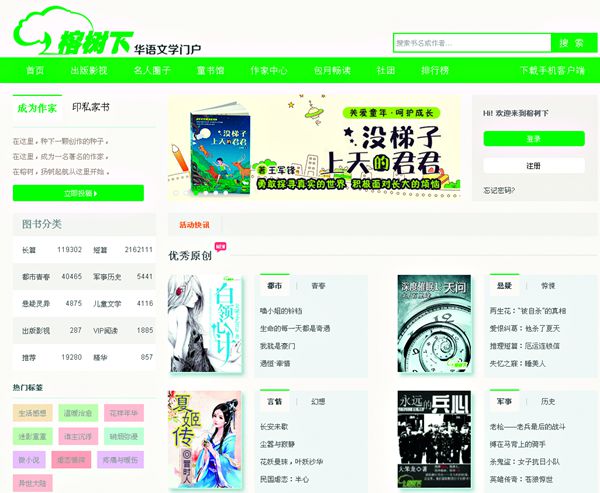Online Literature Spearheads China’s Cultural Industry
China Today by VERENA MENZEL, December 23, 2016 Adjust font size:
Mature Production Chain
Perhaps most important, this formal adjustment to the target medium at the same time creates an ideal link for commercial remarketing of literary content through other media channels. It is this potential for remarketing that could account for the great success of Chinese online literature. It might also explain why this particular segment of the cultural industry segment does so well in China.
Whichever author achieves a breakthrough on the Internet in China stands a good chance of finding their way into the traditional print market. A typical success story starts with Internet-hype, transforms into a re-publishing of the story in book form, and ends in adaptation of the content into a script for a movie or TV series, or as a basis for manga, comics, or computer games.
Thus, over the past years, a mature production chain has been spun into China’s web literature, and the cycle from online breakthrough to remarketing in other media has become shorter.
Here China differs somewhat from industrialized nations like Europe and the United States, as well as its Asian neighbors Japan and South Korea, where specific pop culture production mechanisms for all types of media were fully developed well in advance of the Internet era.
In these countries, genre novels have for many years been successfully remarketed as movie or television adaptations, and remodeled into cartoon or manga books. But in China these economical mechanisms did not emerge until much later.
Whereas most marketing structures remained stable in the Western industrialized nations after the Internet arrived on the scene, albeit with certain small adaptations, in China these mechanisms were relatively underdeveloped upon the advent of the World Wide Web. They therefore seemed more amenable to adaptation.

China’s first web literature portal.
In China, the success of the Internet suddenly opened up a whole new space, which young amateur and professional writers put to maximum use. As a consequence, new emerging Chinese writing portals could absorb many resources formerly controlled by the traditional literary industry. In the fully developed literature markets of many Western countries, however, these resources stayed in the hands of big, long-established publishing houses.
Over the last years, new cultural players in the literature market have managed not only to build a huge fan base but also to attract cash from the anime, cartoon, and games sector (ACG sector). According to sootoo.com statistics, the vast majority of Chinese web literature fans are male (76 percent). Furthermore, most share a taste for ACG culture as well as Anglo-American or Japanese-Korean TV series. This also plays into the hands of web portals and authors of online literature as regards further marketing of successful online works.
Writers’ Rich List
Today, some of the more successful web authors earn millions of yuan. China’s most commercially successful Internet author in 2015 was Tangjia Sanshao, as executive vice president of the Publishing Association of China Wu Shulin stated at the international conference “Story Drive,” organized by the Frankfurt Book Fair in China’s capital Beijing.
According to Wu, Tangjia Sanshao pocketed around RMB 110 million (US $16.5 million) last year from his online literature. Five other web writers received revenues of more than RMB 50 million, and more than 160 authors earned a yearly salary in excess of RMB one million.
But such success stories remain exceptions. “There are millions of authors on the web today,” Wu said. “Only a few make the breakthrough.” Among the reasons why is undoubtedly that characteristic features of the Internet, namely, its low threshold, prompt, non-bureaucratic distribution channels, potential to reach an immensely wide readership, and independence from traditional printed media boundaries, are both a blessing and a curse.
“There are still big discrepancies in quality,” Wu said. Critics hold that there is a high level of commercialization, and even pieces which, upon taking a closer look, turn out to be nothing more than clever advertisements.
Moreover, some experts bewail the absence of an advanced system of literary criticism for the online genre. So far, the tastes of the masses set the tone. “Some of the contents glorify violence or are questionable in other ways,” Wu said.
Another problem yet to be solved is that of intellectual property. “In the end, the function of traditional publishing houses as guarantors of quality remains indispensable,” remarked Jürgen Boos, president of Frankfurt Book Fair, on the margins of the “Story Drive 2016.” He added: “This also applies to the Chinese market.”
However, it is an indisputable fact that, since appearing at the end of the 1990s, China’s online literature has grown from a small niche genre not taken seriously for some considerable time into a promising and influential new sector of the country’s cultural industry. One reason for the success of China’s web literature is undoubtedly its potential for adaptation into movies and television series, or re-marketing in printed form.
Consequently, China’s web literature has long since hit the mainstream of the country’s Internet-centered readership. The future development of literary quality will finally depend on the qualitative demands of the targeted audience.
However, there seems little doubt that the online literature boom has created an exciting new field of experimentation, nurtured by ideas from those of China’s authors and readers who were born in the 1970s and after. This artistic playing field will likely act as inspiration for China’s cultural industry as a whole, and could also stimulate development of the cultural industry in the West.